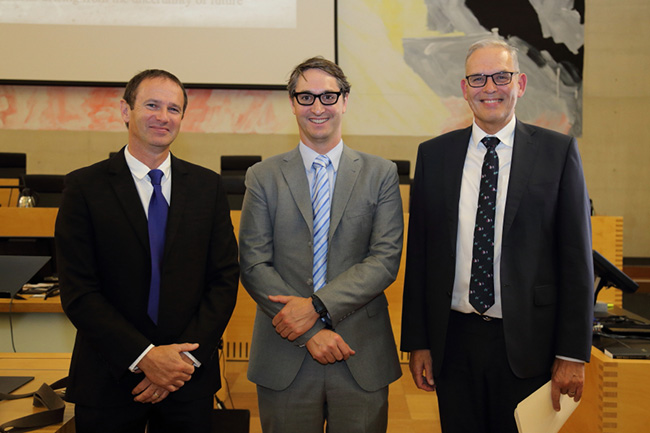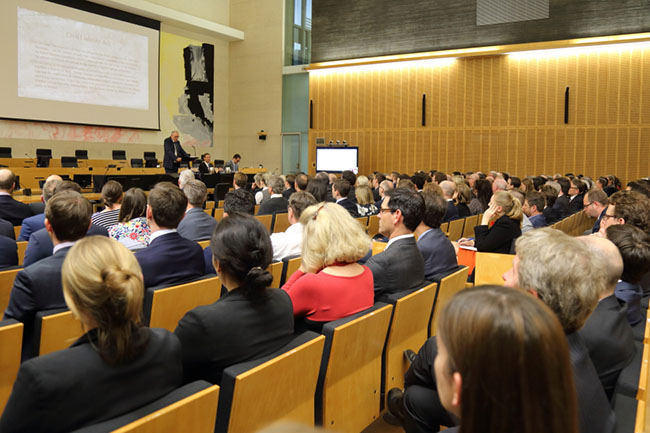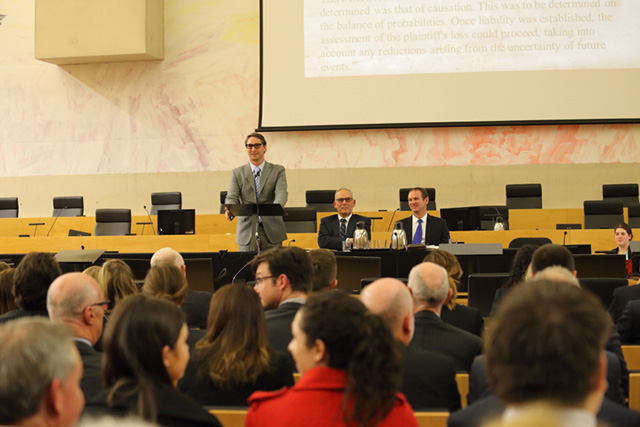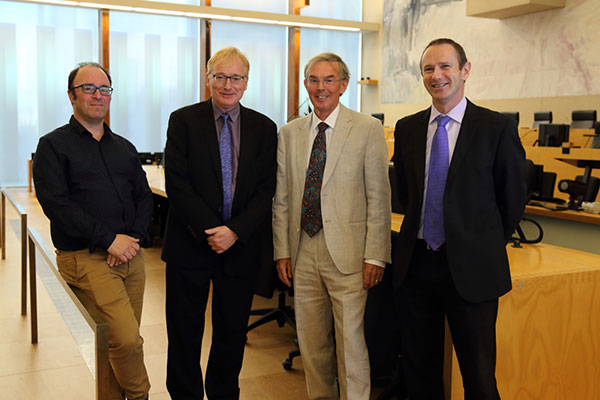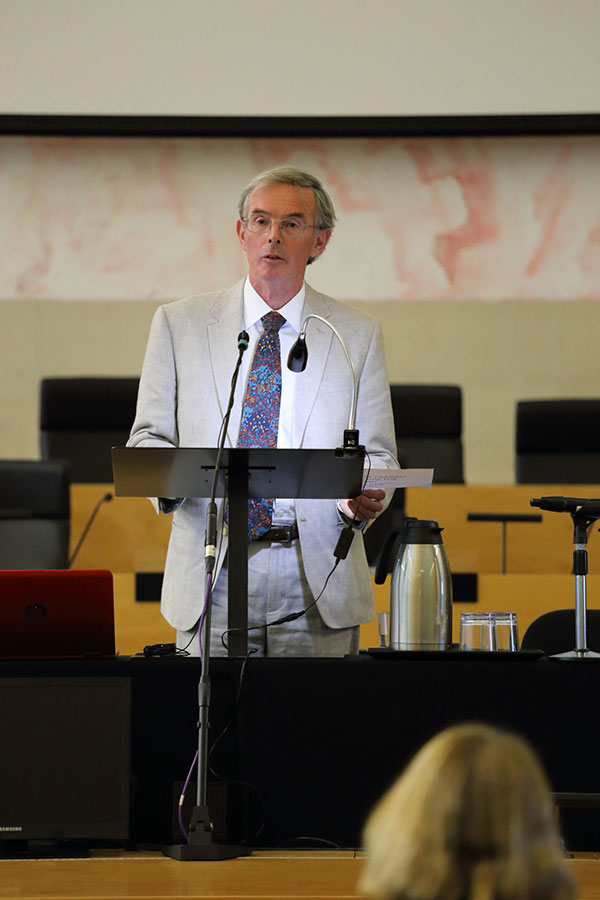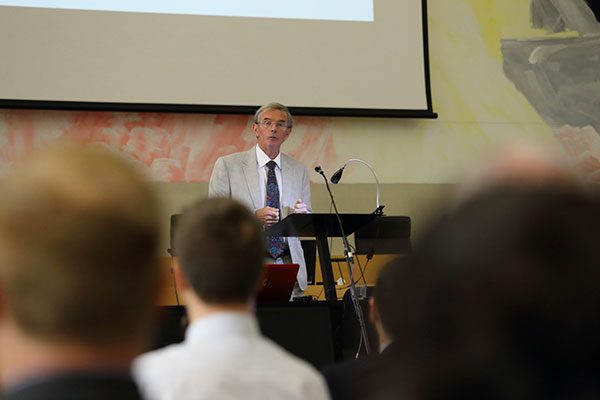2017 Seminar programme
- Can There Ever be Affordable Family Law?
- Causation and Loss of Opportunity
- Statute Law and Common Law
- Re-assessing the Principle of Individual Criminal Responsibility
Speakers include leading members of the judiciary, bar and academia, from Australia and overseas.
Seminar 1: Can There Ever be Affordable Family Law?
| Date | 9 May 2017 |
|---|---|
| Speaker | Professor Patrick Parkinson, A.M, The University of Sydney |
| Commentator | The Hon Stephen O'Ryan QC |
| Chair | Mr Tom Kirk QC |
| Abstract | Despite numerous reforms to the Family Law Act 1975 over many years, the current operation of the family law system continues to be a source of great dissatisfaction to almost everyone caught up in it - including many judges. For legally represented people, it is hugely expensive – far more than most people can reasonably afford. Part of the cost is due to the very long delays (sometimes two to three years) before getting to trial and the number of court events required before reaching that point. The standard response to these problems is to call for more resources - especially more judges. This will help – of course; but there are many reforms that could be made within the existing budgetary envelope to ensure that the system works much better for ordinary Australians. These reforms include obligations on practitioners and judges similar to those contained in the Civil Procedure Act 2005 (NSW) to facilitate the just, quick and cheap resolution of the real issues in the proceedings; the greater use of costs orders against people who pursue unreasonable or unnecessary applications or responses to applications; greater enforcement of the duty to try to sort out matters without filing legal proceedings, listing priority to be given to parties who can demonstrate that they have taken all reasonable steps to try to resolve their dispute; the expansion of arbitration, and the use of default rules to remove certain categories of case from the courts entirely. This paper is intended to stimulate a dialogue between the courts, the legal profession and the government about what can be done to make family law more affordable – both for litigants and taxpayers - and more effective to assist ordinary Australians at an extraordinarily difficult time in their lives. |
| Speaker's Biography | Patrick Parkinson is a professor of law at the University of Sydney and a specialist in family law, child protection and the law of equity and trusts. He is also Special Counsel at Watts McCray Lawyers, Sydney and Canberra. He was President of the International Society of Family Law from 2011-2014. He chaired the review of the Child Support Scheme in 2004-05 which led to the present law, and was instrumental in the establishment of the nationwide system of Family Relationship Centres from 2006 onwards. He is also the Immediate Past President of the International Society of Family Law. Professor Parkinson's books include Australian Family Law in Context (6th ed, 2015), Tradition and Change in Australian Law (5th ed, 2013), Family Law and the Indissolubility of Parenthood (2011), The Voice of a Child in Family Law Disputes (with Judy Cashmore, 2008), Child Sexual Abuse and the Churches (2nd ed, 2003) and Principles of Equity (editor, 2nd ed., 2003). |
| Paper |
Seminar 2: Causation and Loss of Opportunity
| Date | 27 July 2017 |
|---|---|
| Speaker | The Hon. Justice David Jackson, Supreme Court of Queensland |
| Commentator | Professor Kit Barker, The University of Queensland |
| Chair | The Hon. Justice James Edelman J (High Court of Australia) |
| Abstract | Causation is a necessary element in a damages claim. The typical causal question at common law is whether the claimant's loss was caused by the defendant's wrong? However, relatively recently courts have focussed closer attention on what will answer the causal question yes or no. Correspondingly, recently courts have allowed or denied recovery of damages for loss of an opportunity to obtain a better financial or physical outcome as damage caused by the defendant's wrong. Around the common law world, some surprising differences have marked these developments. In Australia, damages are recoverable for loss of a valuable commercial opportunity to receive a benefit but not for loss of an opportunity for a better medical outcome. In the United States, it is the other way around. England and Wales have a different legal structure as well. This lecture will attempt to trace the differing developments, the reasons for them and to offer some tentative suggestions as to where the law might further develop. |
| Paper | Some Thoughts About Causation (The Hon. Justice David Jackson) |
Seminar 3: Statute Law and Common Law
| Date | 17 August 2017 |
|---|---|
| Speaker | Adam Pomerenke QC |
| Commentator | Dr Stephen Donaghue QC, Solicitor-General of the Commonwealth of Australia |
| Chair | The Hon Justice Peter Applegarth, Supreme Court of Queensland |
| Abstract | The Constitution, the statute law of the Commonwealth, States and Territories, and the common law of Australia have been said together to form 'one system of jurisprudence'. The 'symbiotic' relationship between the common law and statute law has been the subject of increasing attention in Australia in recent years. That attention is warranted given the exponential growth in the volume and scope of statute law throughout Australia. The issues that arise extend beyond statutory interpretation and direct statutory modification of the common law. They include the implications of giving common law concepts statutory force and remedies, and the capacity of statute law to influence the content and development of the common law in areas beyond the direct operation of the statute. Coherence across Australia's 'one system of jurisprudence' has emerged as an important consideration, although it is yet to be fully developed. |
| Paper |
Seminar 4: Re-assessing the Principle of Individual Criminal Responsibility
| Date | 2 November 2017 |
|---|---|
| Speaker | Andrew Ashworth, CBE, QC, DCL, Emeritus Vinerian Professor of English Law, University of Oxford |
| Commentator | Professor Jeremy Gans (The University of Melbourne) |
| Chair | Professor Simon Bronitt (The University of Queensland) |
| Abstract | Is there anything wrong with holding a person criminally liable for another’s act or failure to act? In what types of situation does contemporary criminal law go beyond the principle that a person should only be penalised for conduct or consequences that he or she was at fault for bringing about? Is that a principle that should generally be respected, or does the current emphasis on security and prevention justify a more ‘pragmatic’ criminal law? The lecture will explore these fundamental questions in the context of omissions offences, preventive offences, corporate criminal liability and other developments. |
| Speaker's Biography | Professor Ashworth was the Vinerian Professor of English Law from 1997 to 2013, and is now Emeritus Professor. He obtained his LL.B. from the London School of Economics (1968), and then took the B.C.L. at Oxford (1970). He obtained a Ph.D. from Manchester University (1973). In 1993 he was awarded the degree of D.C.L. at Oxford and was elected a Fellow of the British Academy. In 1997 he was appointed a Q.C. Honoris causa. In 1999 he was appointed a member of the Sentencing Advisory Panel, becoming its chair in 2007 until its abolition in 2010. He was awarded the degree of LL.D. honoris causa at De Montfort University in 1998, the degree of Jur. D. honoris causa at Uppsala University in 2003, and the degree of LL.D. honoris causa by the London School of Economcis in 2014. His first teaching position was as Lecturer (1970-76) then Senior Lecturer (1976-78) at Manchester University. From 1978 to 1988 he was Fellow and Tutor in Law at Worcester College, Oxford, and he served as Acting Director of the University's Centre for Criminological Research from 1982 to 1983, and again from 2003 to 2005. In 1988 he was appointed Edmund-Davies Professor of Criminal Law and Criminal Justice at King's College London, and held that post until moving to All Souls College to take up the Vinerian chair in 1997, retiring from that chair in 2013. |
| Paper | The Diffusion of Criminal Responsibility - A Cause for Concern (Prof Andrew Ashworth) |
| Presentation | The Diffusion of Criminal Responsibility - A Cause for Concern (Powerpoint presentation) |
